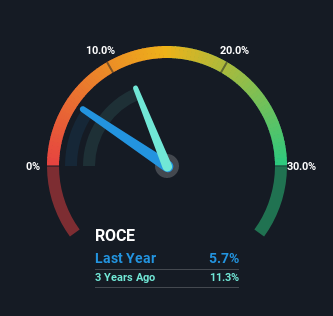- Hong Kong
- /
- Communications
- /
- SEHK:285
BYD Electronic (International) (HKG:285) Will Be Hoping To Turn Its Returns On Capital Around

There are a few key trends to look for if we want to identify the next multi-bagger. In a perfect world, we'd like to see a company investing more capital into its business and ideally the returns earned from that capital are also increasing. Ultimately, this demonstrates that it's a business that is reinvesting profits at increasing rates of return. Having said that, from a first glance at BYD Electronic (International) (HKG:285) we aren't jumping out of our chairs at how returns are trending, but let's have a deeper look.
Return On Capital Employed (ROCE): What is it?
If you haven't worked with ROCE before, it measures the 'return' (pre-tax profit) a company generates from capital employed in its business. The formula for this calculation on BYD Electronic (International) is:
Return on Capital Employed = Earnings Before Interest and Tax (EBIT) ÷ (Total Assets - Current Liabilities)
0.057 = CN¥1.4b ÷ (CN¥41b - CN¥16b) (Based on the trailing twelve months to December 2021).
Thus, BYD Electronic (International) has an ROCE of 5.7%. In absolute terms, that's a low return and it also under-performs the Communications industry average of 7.6%.
Check out our latest analysis for BYD Electronic (International)

In the above chart we have measured BYD Electronic (International)'s prior ROCE against its prior performance, but the future is arguably more important. If you'd like, you can check out the forecasts from the analysts covering BYD Electronic (International) here for free.
What Can We Tell From BYD Electronic (International)'s ROCE Trend?
In terms of BYD Electronic (International)'s historical ROCE movements, the trend isn't fantastic. To be more specific, ROCE has fallen from 9.2% over the last five years. Although, given both revenue and the amount of assets employed in the business have increased, it could suggest the company is investing in growth, and the extra capital has led to a short-term reduction in ROCE. And if the increased capital generates additional returns, the business, and thus shareholders, will benefit in the long run.
On a related note, BYD Electronic (International) has decreased its current liabilities to 39% of total assets. So we could link some of this to the decrease in ROCE. What's more, this can reduce some aspects of risk to the business because now the company's suppliers or short-term creditors are funding less of its operations. Some would claim this reduces the business' efficiency at generating ROCE since it is now funding more of the operations with its own money.
The Key Takeaway
In summary, despite lower returns in the short term, we're encouraged to see that BYD Electronic (International) is reinvesting for growth and has higher sales as a result. And the stock has followed suit returning a meaningful 68% to shareholders over the last five years. So while the underlying trends could already be accounted for by investors, we still think this stock is worth looking into further.
BYD Electronic (International) does have some risks though, and we've spotted 2 warning signs for BYD Electronic (International) that you might be interested in.
For those who like to invest in solid companies, check out this free list of companies with solid balance sheets and high returns on equity.
If you're looking to trade BYD Electronic (International), open an account with the lowest-cost platform trusted by professionals, Interactive Brokers.
With clients in over 200 countries and territories, and access to 160 markets, IBKR lets you trade stocks, options, futures, forex, bonds and funds from a single integrated account.
Enjoy no hidden fees, no account minimums, and FX conversion rates as low as 0.03%, far better than what most brokers offer.
Sponsored ContentValuation is complex, but we're here to simplify it.
Discover if BYD Electronic (International) might be undervalued or overvalued with our detailed analysis, featuring fair value estimates, potential risks, dividends, insider trades, and its financial condition.
Access Free AnalysisHave feedback on this article? Concerned about the content? Get in touch with us directly. Alternatively, email editorial-team (at) simplywallst.com.
This article by Simply Wall St is general in nature. We provide commentary based on historical data and analyst forecasts only using an unbiased methodology and our articles are not intended to be financial advice. It does not constitute a recommendation to buy or sell any stock, and does not take account of your objectives, or your financial situation. We aim to bring you long-term focused analysis driven by fundamental data. Note that our analysis may not factor in the latest price-sensitive company announcements or qualitative material. Simply Wall St has no position in any stocks mentioned.
About SEHK:285
BYD Electronic (International)
An investment holding company, primarily engages in the design, manufacture, assembly, and sale of mobile handset components, modules, and other products in the People’s Republic of China and internationally.
Solid track record with excellent balance sheet.


